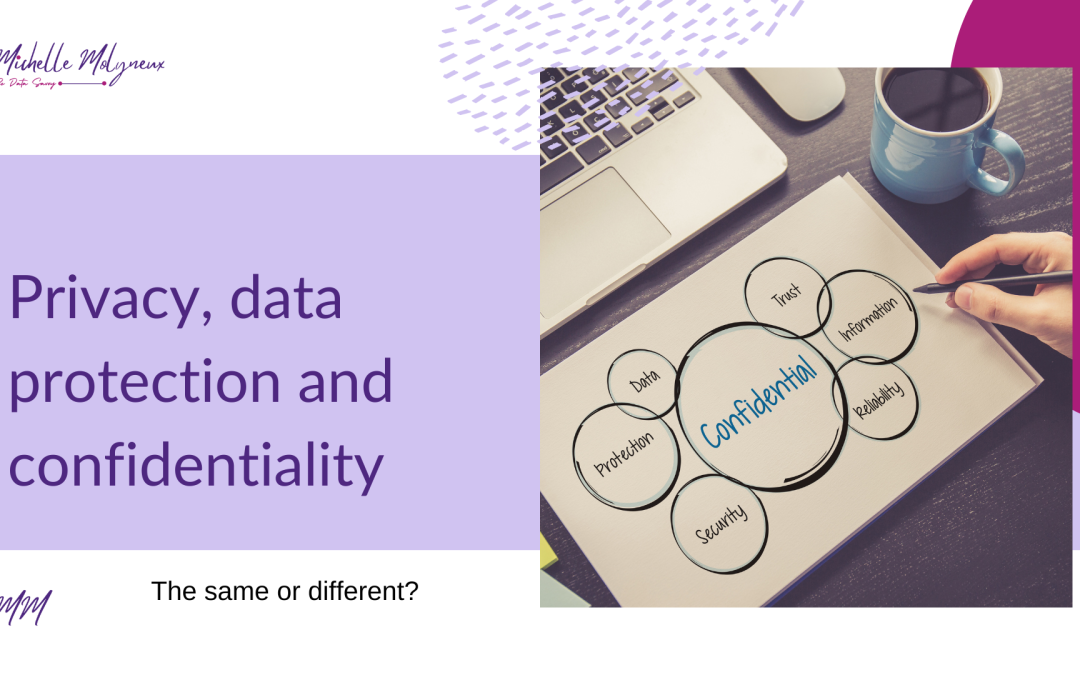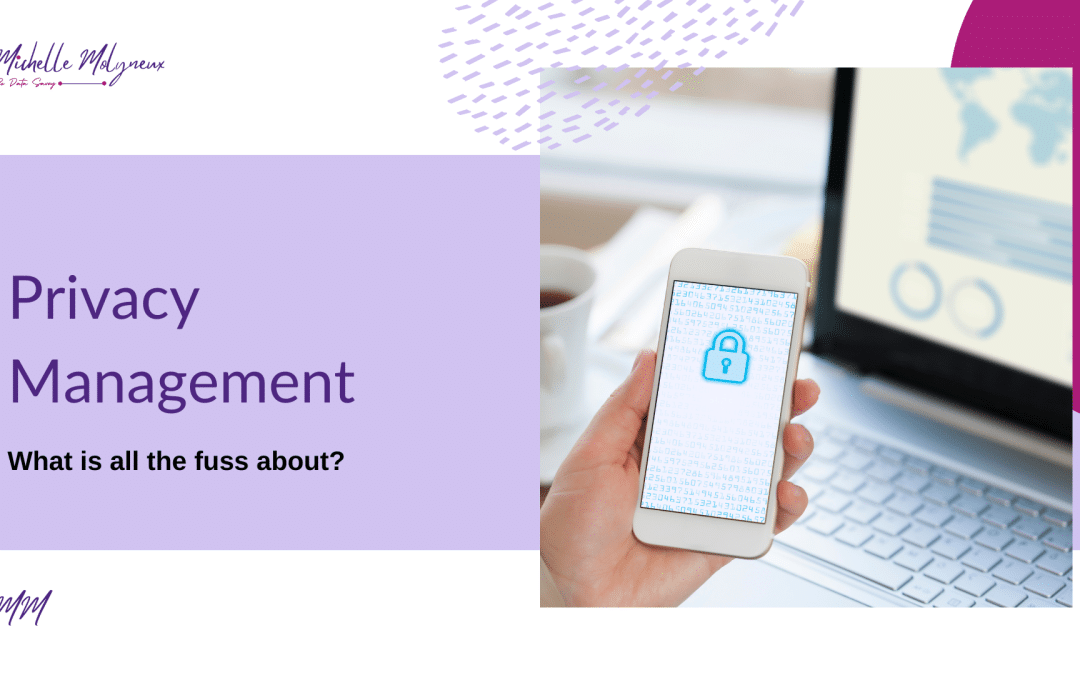


Privacy, Data Protection and Confidentiality
Privacy, data protection and confidentiality are interconnecting terms. Are they the same or different?
They can sometimes be viewed as the same thing. But there are differences. Let’s unpick them and see how they are essential in your business.
(more…)
Privacy Management – What is all the fuss about?
Privacy management can be a contentious issue. Isn’t it the business’s data when I have it? The data is out there, so why can’t I use it? Why should businesses care about the management of data and privacy?
History
The Universal Declaration of Human Rights in 1948, has one of the earliest statements towards the right to an individual’s privacy.
That was over 70 years ago, and the rights of an individual, in relation to privacy, are still being defined and redefined; 1973 and the first Data Act, in Sweden. The 1998 Data Protection Act in the UK and then, subsequently, the 2018 General Data Protection Regulations (GDPR), led to countries around Europe updating their own data protection laws.
Businesses have adapted and changed in 70 years, especially with the advancement and speed in technology. Hence the changes and updates in legislation, especially in relation to information sharing.
Privacy conflict
Businesses need data to run their businesses. Ideally, many businesses would say, they need to gather information to contact prospective clients and use that data as they want within their business. Look at the big tech companies, like Meta, Google and Amazon, who rely on the collection and ‘reusing/distributing’ of data as a fundamental cornerstone of their business. The selling of data can be a considerable income stream.
It is no wonder that businesses, no matter how big or small, have difficulties with privacy; especially when you have to balance the needs of the business with the needs of the individual. The individual has rights!
And there is the conflict. Many businesses argue either the information is out there or that the person has given it to them, so why can’t I use it the way they want to?
Good data management is good for business. Having everything in place can mean that things run smoother, and ore importantly, it can help reduce costs (especially in relation to software).
Who’s data is it?
GDPR set out to clarify the importance of privacy and data security. More importantly, it determines who the owner of the data is. The individual owns the data, and not the business. Businesses are, in effect, custodians of the information held by a living person. As a result, they have to follow the principles of the regulations.
- Lawfulness, Fairness and Transparency
- Purpose limitation
- Data minimisation
- Accuracy
- Storage limitation
- Integrity and confidentiality
- Accountability
In short, that means that businesses need to
- Identify the legal reason for collecting and storing the information AND have a way of informing the individuals.
- Ensure individuals’ rights are protected and acted upon.
- Only use the information for the purpose it was collected. This means we can not collect information and then use it for whatever reason we want, regardless of it being in the public domain.
- Only collect and store the bare minimum we need for the minimum amount of time we need to store it
- Ensure that the information we keep is accurate and if not correct it
- Ensure that the data is not lost or destroyed
- Being able to show compliance with the legislation.
Managing privacy
Saying we are data protection compliant is not enough. Businesses need to prove it. Some key areas to look at are
- Know your data
- Map out what data you collect, save and keep; for what reason, and where it is.
- Only use it for the purpose collected
- One example of this is, networking contacts can not be added to your email marketing or send sales emails. They consented for you to have their details; they did not consent for you to add them to your email marketing
- Keep it up-to-date and accurate
- Account status, contact information, and payment history.
- Assess, review, and update
- Assess what documentation you have and need
- Review for updates and changes in practice
- Look at trends in data security
- Secure it
- Ensure that physical material is locked away securely
- Ensure digital devices are secure and backed-up
- Training
- Train your staff on what is data protection, and IT security
- Have policies and processes in place, so they know what to do
- Keep records
- log incidents and lessons learned
- keep records of equipment, software
- risk assessments and DPIAs
Sounds complicated?
It doesn’t need to be complicated. Help is at hand. As a data protection specialist, I am here to support and assist with your data protection woes. Why not get in touch?

Five Tips for GDPR
If GDPR and compliance are a concern for you or your organisation, don’t worry. Taking all the different aspects in at once can (and probably has) caused everyone to feel a little overwhelmed at some point. But it doesn’t need to. Here are the five tips to know about and why they matter.
Transparency
When it comes to GDPR, transparency is a fundamental principle. The reason why that’s the case is simple. It gives individuals as much control over their data as possible and facilitates their rights.
Control and rights are both fundamental underpinning principles of GDPR.
How does a company demonstrate transparency? The content of privacy notices is a good start. Good, compliant examples include
- the contact details of the company;
- if required, the Data Protection Officer,
- the purpose and lawful bases for processing the data
- and the categories of personal data you hold to name a few.
Mapping your data
Data mapping confuses some, but its principle is relatively easy. Mapping your data means establishing what information you hold and exactly how it flows through your company. This type of audit (also known as a mapping exercise) should be performed regularly by assigned individuals.
Doing so ensures it is maintained and amended as needed by a person or persons who are aware of their responsibilities.
Reporting breaches
Breaches can unfortunately happen, and on a long enough timescale, something similar to the list below probably will.
Data breaches can take many forms, such as:
- Device loss or theft
- Phishing scams
- Hacking
- Lost or stolen external USB drives
Breaches can also result from carelessness or lack of awareness, such as unattended computers and, especially recently, working from home on unauthorised personal devices and unprotected networks.
Reporting breaches of personal data have been mandatory since before the GDPR came into force. It just became more visible,, and the assessment for reporting changed. The Information Commissioner’s Office has a dedicated section for more information about breach reporting.
Knowing your subject’s rights
Data subjects have a wide range of rights relating to the data you hold about them, making it essential to know why you are processing the information you hold about them.
Data subjects have some or all of the following rights:
The right to be informed (Including why you are processing their data, how long you intend to retain it and who you might share it with.)
A right of access (Typically referred to as a Subject Access Request or SAR which must be dealt with in a timely way.)
The right to rectification (If the subject feels their data is incomplete or inaccurate.)
A right to erasure (Also known as the right to be forgotten, sometimes for legal reasons this may not always apply)
The right to restrict processing (In certain circumstances, an individual as the right to store their data but to stop you using it.)
A right to portability (The right to obtain their data and reuse it for another purpose or service.)
Being accountable
For both controllers and processors, demonstrating compliance and putting measures in place to meet the requirements for accountability will mitigate the risk of enforcement action. Still, it will also build trust in your business and its services and raise you above the competition.
For help and advice around transparency, avoiding breaches, mapping the data you use, subject’s rights and accountability, get in touch today; I’d love to offer you help and advice in the field I specialise in.
